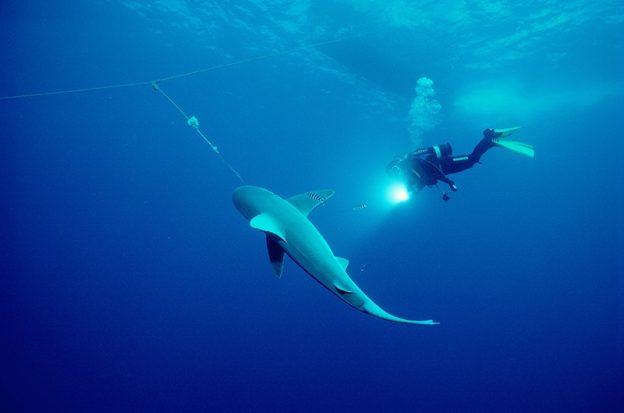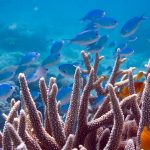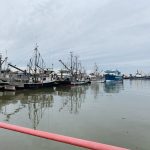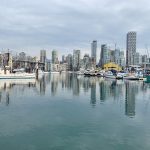Sharing a space with others has its challenges – especially when your new roommate is an industrial fishing vessel trying to evict you from your spacious home. Many pelagic shark species have successfully avoided fishing lines given their extensive ecological range away from coastal regions. Due to fishery expansion, vessels are now extending their network to include off-shore locations where sharks once assumed a safe home.
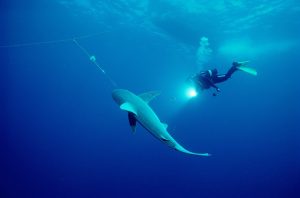
Longline fishing vessels operate by throwing a 100km line into the sea with 1000 baited hooks and thus are a prominent threat to pelagic sharks. This fishing practice is commonly used on the high seas – an area conveniently outside of national jurisdiction where species management is minimal. Recently, pelagic shark habitat ranges were tracked to investigate the areas of overlap with longline fishing vessels, and unsurprisingly, one in four habitats overlapped with fishing regions. So, how do we restore the peace between these feuding roommates?
Sharks tracked in this study varied, including great whites, shortfin mako, and blue sharks. Among this group, shortfin mako and North Atlantic blue sharks are especially vulnerable due to their significant overlap with fishing vessels. Up to 76% of the locations these sharks visited most in a month were also occupied by longline fishers. Shortfin mako sharks are uniquely the world’s fastest shark and are at the forefront of this fishery nightmare due to their value being associated with fishing for meat and fins. This intense overlap suggests that fishers are focusing on these hotspots maintaining the overfished and endangered status of makos.
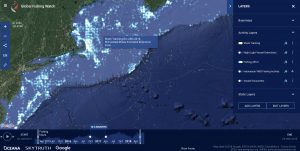
Sharks are in the elasmobranch group along with rays and skates. This group often coincides with a need for conservation because they produce few offspring, suggesting they have lower potential for population recovery compared to other fish groups. Mako are listed as endangered by the IUCN and their trade is being regulated by governments under the Convention on International Trade in Endangered Species of Wild Fauna and Flora (CITES). In 2019, scientists issued a bleak update on mako populations and recommended a full ban on fishing. Canada has recently put words into action by banning fishing of shortfin mako sharks in Atlantic fisheries and we can hope that other countries will follow suit.
Scientists note that the mako population will still be in decline even if fishers halt killing for the next 15 years which perfectly encapsulates the severity of this issue. This makes them a high priority for conservationists, scientists, fishers, politicians, and you.
Sharks are often painted as a villain, but play an essential part in maintaining a healthy oceanic ecosystem. Although we see sharks as something to fear, what we should really dread is a world without them.
References
Global Fishing Watch. (2019). Home. Global Fishing Watch. Retrieved from https://globalfishingwatch.org/map
Griffin, E., Miller, K. L., Freitas, B., & Hirshfield, M. (2008). Predators as Prey: Why Healthy Oceans Need Sharks. Retrieved from https://oceana.org/sites/default/files/reports/Pre dators_as_Prey_FINAL_FINAL1.pdf
Nickson, A. (2019). Endangered mako sharks remain vulnerable to overfishing. Retrieved from https://www.pewtrusts.org/en/research-and-analysis/articles/2019/11/08/endangered-mako-sharks-remain-prey-to-overfishing
Oceanographic Staff. (2020) Retention of endangered shortfin mako sharks in Atlantic fisheries banned by canada. Oceanographic. Retrieved from https://www.oceanographicmagazine.com/news/canada- mako-sharks/
Sims, D. (2019). Sharks: One in four habitats in remote open ocean threatened by longline fishing. The Conversation. Retrieved from https://theconversation.com/sharks-one-in-four-hab itats-in-remote-open-ocean-threatened-by-longline- fishing-120849
Shark League. (2019). Scientists issue grim status update on atlantic mako sharks, recommend full ban | project aware. Retrieved from https://www.projectaware.org/news/scientists-issue -grim-status-update-atlantic-mako-sharks-recommend -full-ban
Stevens, J. D., Bonfil, R., Dulvy, N. K., & Walker, P. A. (2000). The effects of fishing on sharks, rays, and chimaeras (chondrichthyans), and the implications for marine ecosystems. ICES Journal of Marine Science, 57(3), 476-494.
Warren, M. (2019). Sharks squeezed out by longline fishing vessels. Retrieved from https://www.nature.com/articles/d41586-019-02265-5
Worm, B., Davis, B., Kettemer, L., Ward-Paige, C. A., Chapman, D., Hetihaus, M. R., … Gruber, S. H. (2013). Global catches, exploitation rates, and rebuilding options for sharks. Marine Policy. 40, 194-204. doi:10.1016/j.marpol.2012.12.034.
What makes mako sharks the fastest sharks in the ocean? | nat geo wild. (2017) [Video file]. Retrieved from https://www.youtube.com/watch?v=v5fo19s4aAc&ab_cha nnel=NatGeoWILD
